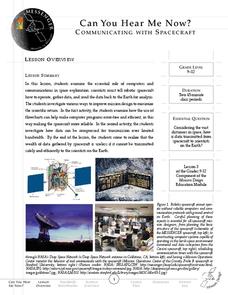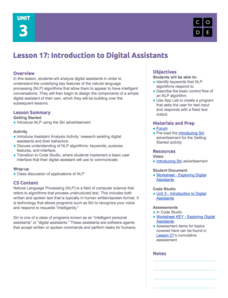Curated OER
Amazon Adventure: a Case Study in Medical Technology And Bioethics
Students test problem-solving skills, the ability to see connections, and the ability to draw conclusions and inferences from information provided in a case study. Given a case study, they formulate a procedure and draw conclusions.
Curated OER
Amazon Adventure: A Case Study in Medical Technology and Bioethics
Students explore a case study. They use problem solving skills to determine initial procedures or experiments necessary slow disease and develop a drug. Students examine FDA drug approval procedures. They consider environmental and...
Curated OER
Science for Technology
Middle schoolers discuss sign language and learn how to spell some words. In this investigative lesson students work with a partner to write and perform sign language on a given topic.
Curated OER
Using Logos and Mission Statements to Communicate Sustainable Forestry Information
Young scholars survey forestry foundations to see how they represent important information into their logos and mission statements. In this forestry lesson plan, students use the information to better understand visual representations...
Code.org
Sending Binary Messages with the Internet Simulator
Show your class how to develop a protocol to solve a problem. Pupils then continue with working with binary messages but refine a protocol to assist with the distinction of individual bits by including a bit rate. Finally, the pairs...
Code.org
How Routers Learn
Your routers don't seem to be routing correctly. To figure out why, pupils act like routers, talk to their direct connects in order to determine as much information about the simulated network as possible. As they learn more about...
Teach Engineering
Show Me the Genes
Give your class a chance to show what they know. In the last installment of a seven-part series, pupils summarize and review what they have learned in the series. They present their solutions for creating a biosensor to detect cancer...
Teach Engineering
Airplanes Everywhere: Land! Water! Sky! Oh, My!
How important is aviation? Using the background information, teachers provide the class with a brief history of aviation. The class discusses how airplanes are important to the area of transportation in the 17th installment of a...
Teach Engineering
Processes on Complex Networks
Introduces your class to random processes in networks with an activity that uses information about disease spread using the susceptible, infectious, resistant (SIR) model. Participants determine whether a susceptible person becomes...
Teach Engineering
Viscous Fluids
Elasticity and viscosity. Help your class understand the similarities and differences with an introduction to viscous fluids. After describing four types of fluid behaviors: shear thinning, shear thickening, Bringham plastic,...
Teach Engineering
Abdominal Cavity and Laparoscopic Surgery
Get to know the human body from the inside out. The first lesson plan in a series of 10 introduces the class to the abdominopelvic cavity. Biomedical engineers need to understand the region of the body as they develop and improve...
Messenger Education
Can You Hear Me Now?—Communicating with Spacecraft
Radio signals transmitted to Pluto take five hours to reach their destination! In these two activities, young scientists explore data communication in space. In activity one, pupils learn how data is gathered and sent back to Earth....
Kenan Fellows
Evaluating Sensors and the Impacts of Physiological Stress: Designing a Wearable Device for Rescue Workers
A long-term project has scholars consider ways in which sensors help monitor physiological stress levels of rescue workers. They design and create a portable device for this purpose. Techies to the rescue!
Kenan Fellows
Letter Writing to Politicians on Environmental Issues
Let your voices be heard! Pupils research local and national environmental concerns using the Internet. Class members determine an issue they deem important and draft a letter to a local politician expressing their...
Teach Engineering
A Simple Solution for the Circus
Class members are challenged to design a device that will move a circus elephant into a train car. Groups brainstorm ideas that use simple machines to load the elephant. They then choose one of their ideas, sketch a plan, and present it...
Code.org
Introduction to Digital Assistant Project
How does a computer recognize voice commands? Scholars learn about digital assistants and natural language processing (NLP) algorithms in the ninth lesson of the series. They begin building a simple digital assistant and work on this...
Teach Engineering
Connect the Dots: Isometric Drawing and Coded Plans
Individuals discover how to draw cubes on triangle-dot paper. They use cubes to build structures and draw corresponding isometric drawings on dot paper in the second lesson of the series of five. The activity also introduces the concept...
Teach Engineering
Let's Take a Spin: One-Axis Rotation
Investigate the effect of one-axis rotations on geometric figures. Scholars learn to use snap cubes and the right-hand rule to draw figures after rotations about the x-, y-, or z-axes. They try their hands at examples created by the...
Teach Engineering
Energy Intelligence Agency
Protect the world from energy depletion—join the Energy Intelligence Agency. Using a set of cards, pupils distinguish between correct and incorrect information regarding energy use in the United States. They analyze graphs and diagrams...
Teach Engineering
Will It Fly?
Go fly a kite, then fly a plane! The 19th part of a 22-part unit on aviation looks at the way kites and gliders help aid in the understanding of flight. Pupils discuss how engineers used kites to influence airplane designs.
Teach Engineering
Future Flights: Imagine Your Own Flying Machines!
What will flying look like in the future? The 21st lesson in a 22-part unit on aviation reviews the major aspects of the lesson. Pupils brainstorm ideas of a future flying machine.
Curated OER
Math On the Job
Investigate different types of math required for specific jobs. For this math in occupations lesson, use the Internet to research what type of math one might need to know in order to be successful in different jobs. Complete a...
Institute of Electrical and Electronics Engineers
Radio Reception and Transmission
After reading about radio transmission, application, and the difference between AM and FM, small teams of engineers use a kit to construct an FM radio and then send and receive broadcasts. This is an ideal activity for middle school STEM...
Macmillan Education
Teamwork
Learners develop self-awareness and discuss the importance of cooperation and communication through worksheets and hands-on, collaborative activities.

























